The Role of Exaphnes in
Early Greek Literature
The Role of Exaphnes in
Early Greek Literature
Philosophical Transformation in
Platos Dialogues and Beyond
Joe Cimakasky
LEXINGTON BOOKS
Lanham Boulder New York London
Published by Lexington Books
An imprint of The Rowman & Littlefield Publishing Group, Inc.
4501 Forbes Boulevard, Suite 200, Lanham, Maryland 20706
www.rowman.com
Unit A, Whitacre Mews, 26-34 Stannary Street, London SE11 4AB
Copyright 2017 by Lexington Books
All rights reserved. No part of this book may be reproduced in any form or by any electronic or mechanical means, including information storage and retrieval systems, without written permission from the publisher, except by a reviewer who may quote passages in a review.
British Library Cataloguing in Publication Information Available
Library of Congress Cataloging-in-Publication Data Available
Library of Congress Control Number: 2017937801
 TM The paper used in this publication meets the minimum requirements of American National Standard for Information Sciences Permanence of Paper for Printed Library Materials, ANSI/NISO Z39.48-1992.
TM The paper used in this publication meets the minimum requirements of American National Standard for Information Sciences Permanence of Paper for Printed Library Materials, ANSI/NISO Z39.48-1992.
Printed in the United States of America
for
Renee Caviston
Acknowledgments
I have been thinking about Plato (and Socrates) since I was introduced to philosophy by Professor John Rettura of Lackawanna College in Scranton, Pennsylvania. Professor Retturas class still resonates with me today, and I am so grateful for his willingness to entertain philosophical questions outside of the classroom. I try to approximate as best I can his approach to philosophy, both inside and outside the lecture hall, now that I find myself teaching courses of my own.
There are several professors from the University of Scranton, including John McGinley, William Rowe, Richard Klonoski, Tim Casey, Ann Pang-White, and Father Patrick Mohr, who I am thankful for having met, studied under, and befriended. Also, I especially want to thank Bill Irwin from nearby Kings College in Wilkes-Barre, Pennsylvania, for his friendship and encouragement. There are many incredible people in philosophy, and Bill is undoubtedly one of the best.
I am also grateful for my friends and professors from Duquesne University in Pittsburgh, Pennsylvania. I am especially indebted to Ron Polansky. Professor Polanskythe Socrates of Pittsburghtaught me so many things that its impossible to articulate the depth and breadth of his influence. Needless to say, this book could not be written without him, and it makes me very happy to call him my friend. Similarly, Patrick Lee Miller inspired an enthusiasm for learning in all its forms, and without whom I wouldnt know what it really means to be an academic. Both of these men remain for me the Platonic Idea of professionalism and philosophical living. I would also like to thank other friends and colleagues from Duquesne University, especially: Joan Thompson, Sarah Alison Miller, Emily Nehl, Dakota Eckenrode, Kristian Sheeley, Sarah Richards, Matthew Valentine, Chelsea Harry, Craig Debban, Marco Acevedo, Tom Sparrow, Robert Guerin, Ariana Ragusa, Chris the mount-dog Mountenay, George Yancey, John Fritz, Chrissy Rawls, Matt Lovett, Taine Duncan, David Hoinski, Heather Hoinski, Louis Butler, and Therese Bonin.
I owe a debt of gratitude to my colleagues and friends at Cabrini University; in particular, Jenn Bulcock, Joe Romano, Sharon Schwarze, Andrew Andy Owen, Tamarah Smith, Matt Slutz, Nick Rademacher, Patti Stocker, Tony Tomasco, and Joe Fitzgerald. They have made my short time in Radnor, Pennsylvania, very rewarding. It is an honor to work with such wonderful people.
Finally, I would very much like to thank Jana Hodges-Kluck, Rachel Weydert, and Laura Chappell from Rowman & Littlefield. This book would not be possible without their time, feedback, and constant support.
Introduction:
The Role of in
Early Greek Literature
Philosophical Transformation in
Platos Dialogues and Beyond
Careful readers of Plato are well aware of the ancient Greek philosophers playful and multilayered construction of his dialogues. And yet, Platos skillful writing and structural organization often leads readers to the same perplexed condition of Socrates interlocutors. On the one hand, most of the dialogues seem to conclude with no obvious answers or agreement. On the other hand, certain themes and principles begin to emerge as the dialogues are pored over and scrutinized. Correlatively, in his Lives of Eminent Philosophers, third-century biographer of Greek philosophers Diogenes Laertius claims that special editions of Platos dialogues were emblazoned with symbols that accented or highlighted various doctrines, repeated idioms, and even editorial revisions. In fact, Laertius states, when the writings were first edited with critical marks, their possessors charged a certain fee to anyone who wished to consult them (III, 6566). Evidently, those ancient readers who were willing to pay the requisite fee were provided with a running symbolic commentary. Presumably, these critical marks imparted guidance and facilitated a more profound grasp of Platos philosophical project.
One can only speculate with respect to the extent and significance of these symbolic annotations, but it stands to reason that philosophical masterworks as subtle and full of nuance as Platos dialogues would contain many esoteric passages, turns of phrase, or even single words whose full import and meaning might be illuminated by a carefully placed sign or symbol. In effect, this symbolic commentary might approximate a contemporary philosophy professors exposition of Platos dialogues. Because no critically-marked copies survive, modern readers are left to wonder how handy these symbols might have been with respect to understanding Platos philosophy.
Nevertheless, shining a light on one of Platos repeated idioms is what the following book is all about. The word that this book examines is, in ancient Greek, (exaphnes). In Platos entire body of work, appears precisely thirty-six times. Usually translated as all of a sudden or simply suddenly, emerges in some of the most significant passages of Platos dialogues. For instance, appears three times in the allegory of the cave in Republic vii, once during the climactic moment of the epistemological digression from the Seventh Letter, and immediately precedes the vision of the Beautiful in Symposium. Translated in Parmenides as the instant, also surfaces in a crucial section of the training exercise that constitutes the latter two-thirds of this challenging dialogue. Examining Platos use of this term reveals a pattern that lays bare the intentional use of and helps readers grasp an essential piece of his philosophical project. It is evident that this term is highly significant, and I demonstrate the connection obtaining between the thirty-six scattered appearances of in order to reveal the role it plays in linking Platos theory of Ideas with philosophical education.
While the word itself has been identified by scholars, a sustained and comprehensive treatment of in Platos dialogues has yet to emerge. For the most part, those commentators who recognize the phenomenon either quickly dismiss it, or are at a loss to explain it. The venerable scholar Francis Cornford, in his Plato and Parmenides (1957), offers a typical summation of in the dialogues: I have not been able to understand how Platos businesslike account of the instant at which the various species of change occur can be connected with the sudden vision of the Beautiful and the doctrine of anamnesis (203). In contrast, I shall demonstrate how the various appearances of are indeed connected. In short, I reveal how in several significant contexts throughout the dialogues, Platos step-by-step, methodical approach to philosophical education culminates with a dynamic capstone signified by the appearance of .

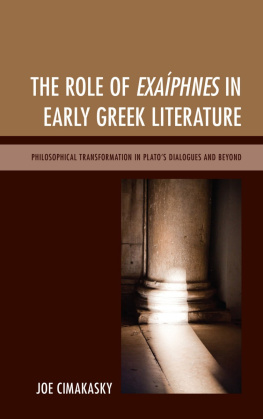
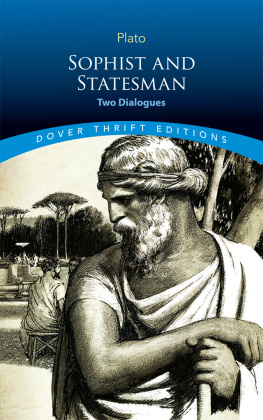
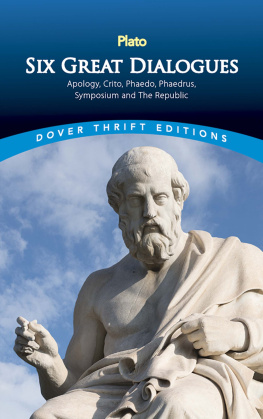

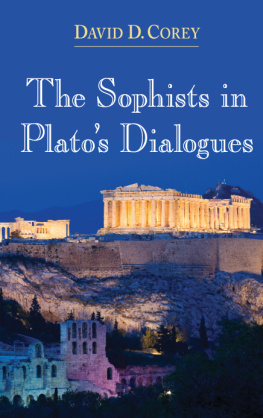
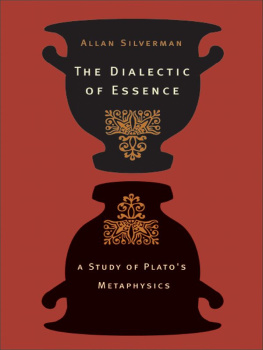


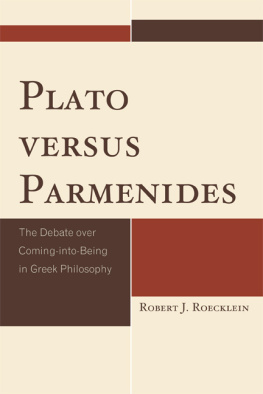
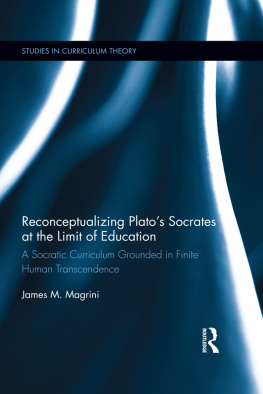
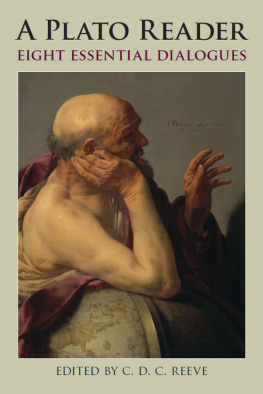
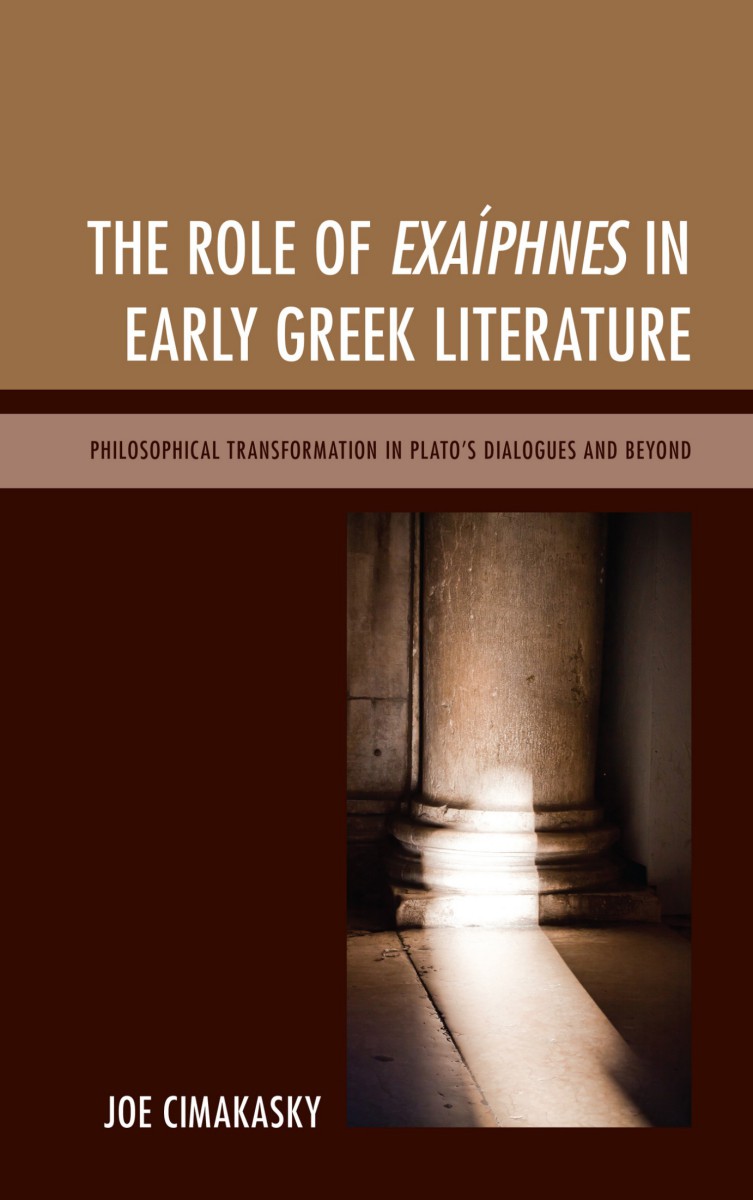
 TM The paper used in this publication meets the minimum requirements of American National Standard for Information Sciences Permanence of Paper for Printed Library Materials, ANSI/NISO Z39.48-1992.
TM The paper used in this publication meets the minimum requirements of American National Standard for Information Sciences Permanence of Paper for Printed Library Materials, ANSI/NISO Z39.48-1992.